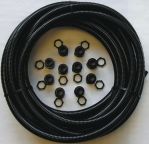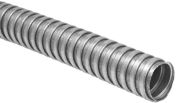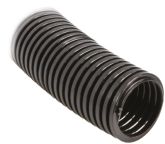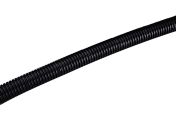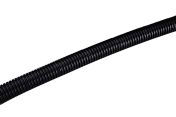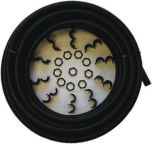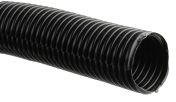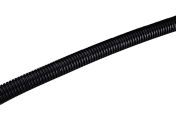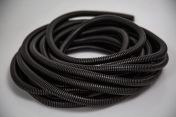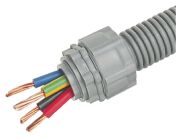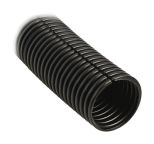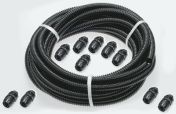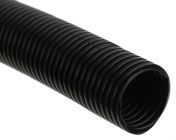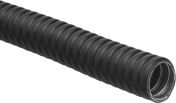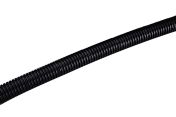- Automation & Control Gear
- Cables & Wires
- Enclosures & Server Racks
- Fuses & Circuit Breakers
- HVAC, Fans & Thermal Management
- Lighting
- Relays & Signal Conditioning
- Switches
- Batteries & Chargers
- Connectors
- Displays & Optoelectronics
- ESD Control, Cleanroom & PCB Prototyping
- Passive Components
- Power Supplies & Transformers
- Raspberry Pi, Arduino, ROCK, STEM Education & Development Tools
- Semiconductors
Conduit
Conduits are tubings used to protect and guide electrical wiring. They are made of materials such as plastic, steel, galvanised steel, nylon, PVC, PP, and steel spring wire, and can be flexible or rigid. Cable conduits are especially useful for protecting exposed wires in open areas, underground, or inside walls.
Different Types of Electrical Conduits
Some common acronyms and terms used when discussing different types of conduits include "rigid" and "flexible." The main types are:
- Electrical conduit
- Flexible conduit
- Metal conduit
These three categories are further divided into specific types of conduits, including:
- IMC (Intermediate Metal Conduit): A sleeker, lighter version of RMC that is often accepted for the same uses as RMC.
- RMC (Rigid Metal Conduit): One of the most durable types of electrical conduits, made of galvanised steel. Has excellent protection and can support boxes, cables, and other electrical equipment.
- EMT (Electrical Metallic Tubing): A thin metal tube that is easy to bend and twist using a conduit bender. It can be cut with a small or 12V reciprocating saw with a high TPI blade.
- FMC (Flexible Metal Conduit): Has a spiral shape that allows it to flex over short distances. It is useful for adding conduits in tight spaces or around existing equipment.
- LFMC (Liquid-Tight Flexible Metal Conduit): Similar to FMC but has a waterproof covering, suitable for use in outdoor areas.
- ENT (Electrical Non-Metallic Tubing): A flexible PVC cable conduit that can be used in place of EMT and run behind walls and encased in concrete. It has a 2-hour fire resistance rating but is not UV-resistant.
- Rigid PVC: Heated and bent before use. It is watertight when properly installed.
- Galvanised Iron (GI) Conduit: A type of electrical conduit made from a mixture of iron and zinc, with a protective coating of galvanisation. Commonly used in electrical installations for the protection and routing of electrical wiring.
Advantages of Electrical Conduits
- Safe and Reliable Wiring: Electrical conduits provide a safe and secure path for electrical wires. It encloses and protects the wires from damage that occurs if they are left exposed.
- Conveniently Used in Humid Places: Electrical conduits are made of materials that are resistant to moisture and humidity. Good for use in damp or humid environments, such as bathrooms and kitchens.
- Long-Term Usage: Electrical conduits are durable, ideal for use in long-term installations. It can withstand the wear and tear of daily use over time.
- Easy to Install: Electrical conduits are relatively easy to install. It can be cut to size and bent to fit around corners - a versatile choice for a wide range of applications.
- Cost-Effective: Electrical conduits are affordable. It is widely available and good for both residential and commercial installations.
Choose the Right Conduit Wiring that Suits You
Selecting the appropriate conduit for your wiring project involves careful consideration of several factors to ensure safety, compliance, and optimal performance.
1. Type of Conduit Material
Electrical conduits are available in various materials, each with its unique properties. PVC cable conduits are a popular choice for its affordability and corrosion resistance, while aluminium flexible conduits offer excellent versatility and durability.
Consider the specific requirements of your application, such as exposure to moisture, chemicals, or extreme temperatures, when choosing the right conduit material.
2. Conduit Size and Capacity
The size of the conduit determines the number and size of cables it can accommodate. Refer to electrical codes and standards to determine the appropriate conduit size based on the number and gauge of wires you plan to run through it. Ensure sufficient space for future expansion or additions to the wiring.
3. Flexibility and Ease of Installation
Flexible conduits, like flexible plastic conduits or flexible underground conduits, are ideal for installations with bends, curves, or tight spaces. Rigid conduits, on the other hand, provide superior protection but may require more effort to install in complex layouts. Choose the type of conduit that best suits the physical constraints, and wiring runs of your project.
4. Compliance with Codes and Standards
Adhering to local electrical codes and standards is crucial for safety and legal compliance. Ensure that the chosen conduit and its installation methods meet all applicable regulations. Consult with a qualified electrician or refer to relevant codes for guidance.
5. Environmental Protection
Consider the environmental conditions in which the conduit will be installed. For instance, flexible underground electrical conduits are designed for mazy wiring runs and buried under the earth, while exposed conduits may require additional protection against moisture, UV exposure, or corrosive substances.
Industrial Applications of Conduits
Conduits are essential components in safeguarding electrical wiring and ensuring the integrity of electrical systems across a variety of industrial settings.
Manufacturing Facilities
In manufacturing facilities, conduits provide a protective pathway for electrical wiring that powers machinery, control systems, and other critical equipment. Flexible conduits offer ease of installation in complex layouts, while rigid conduits provide robust protection in harsh environments.
Oil and Gas Industry
The demanding conditions of the oil and gas industry require conduits that can withstand extreme temperatures, corrosive chemicals, and potential impacts. Aluminum flexible conduit and other specialised conduits are essential for protecting electrical systems in oil rigs, refineries, and pipelines.
Chemical Plants
In chemical plants, where exposure to hazardous substances is common, conduits play a vital role in protecting electrical wiring from corrosive chemicals and ensuring the safety of personnel and equipment. PVC cable conduits offer excellent chemical resistance and are widely used in these settings.
Construction Sites
Conduits are essential on construction sites to protect temporary and permanent wiring from damage during construction activities. Flexible underground electrical conduits are often used to route power and communication cables underground, while other types of conduits protect wiring along walls, ceilings, and other exposed areas.
Data Centres
In data centres, where sensitive electronic equipment and high-density cabling are prevalent, conduits play a crucial role in organising and protecting electrical wiring. Cable conduits help manage cable congestion, prevent electromagnetic interference, and maintain a clean and efficient environment for data transmission.
Delivery Information
RS Malaysia offers a wide array of electrical conduit solutions from leading brands like Adaptaflex, Flexicon, HellermannTyton, and more to suit your wiring needs. Whether you require flexible or rigid conduits, above-ground or underground installations, we provide a comprehensive selection of plastic, PVC, and aluminium options to ensure optimal protection and organisation for your electrical systems. Shop electrical conduits and other wiring equipment like extension leads or cable ducting with us.
For a full overview of our delivery options, including estimated lead times and shipping costs, please visit our Delivery Page.
Popular Searches
Related links
- Conduit Fittings
- Flexicon Flexible Conduit Plastic, Black
- RS PRO Flexible Conduit Plastic, Black
- RS PRO Flexible Conduit Galvanised Steel, Black
- Cable Trunking
- RS PRO Flexible Conduit Galvanised Steel, Black
- RS PRO Flexible Conduit Galvanised Steel, Self Colour
- Flexicon Flexible Conduit Galvanised Steel, Black
